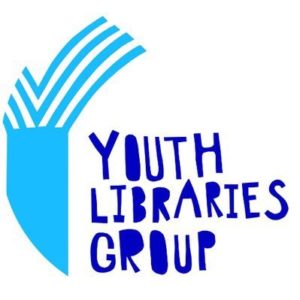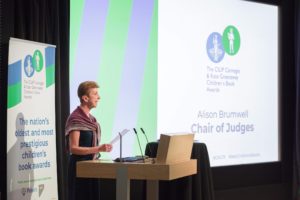The CILIP Carnegie and Kate Greenaway Medals
Category: #Carnegie100, Blog
This blog post is part of our #Carnegie100 series, marking the 100th anniversary of Andrew Carnegie’s death and celebrating his libraries legacy.
The CILIP Carnegie and Kate Greenaway Medals are the UK’s oldest and most prestigious children’s book awards, recognising outstanding writing and illustration in books for children and young people. The CILIP Carnegie Medal is awarded by children’s librarians for an outstanding book written in English for children and young people.
Scotland’s role in the Carnegie Medal
by Jennifer Horan, Youth Libraries Group Scotland Chair and CKG Judge 2016/2017
 The Carnegie Medal was introduced by the Library Association in 1935, named in honour of Andrew Carnegie in the centenary year of his birth. Members decided that it would be awarded for outstanding children’s literature by a British author in order to “raise the level of children’s literature after the golden age of the Edwardian period”. The selected books for consideration would be nominated by librarians, a practice which continues to this day.
The Carnegie Medal was introduced by the Library Association in 1935, named in honour of Andrew Carnegie in the centenary year of his birth. Members decided that it would be awarded for outstanding children’s literature by a British author in order to “raise the level of children’s literature after the golden age of the Edwardian period”. The selected books for consideration would be nominated by librarians, a practice which continues to this day.
The Medal was originally judged by a small team of senior members of the Library Association, but this was criticised by children’s librarians as no one on the panel worked directly with children. After much pressure from the Association of Children’s Librarians – an affiliated section of the Library Association which was later to become the Youth Libraries Section – librarians specialising in children’s services secured equal representation on the selection committee for the considered books in 1947. In 1962, all Library Association sections were reclassified as groups, resulting in the birth of YLG as we know it today. YLG members across all regions called for a change to the rules to allow for nominations of authors from outside Britain to be included, and in 1969 sole control of the Carnegie Medal was given to YLG. 1973 saw the introduction of branch representatives to the
judging panel, so we can assume the first Scottish judge took their role at this time.
There have been three Scottish winners of the Carnegie Medal: Eric Linklater for The Wind on the Moon (1944), Mollie Hunter for The Stronghold (1974) and Theresa Breslin in 1994 with Whispers in the Graveyard. In 2018, Geraldine McCaughrean’s win for Where the World Ends, a novel set on the isolated archipelago of St Kilda, set in motion a remarkable series of coincidences for YLG Scotland: a bench painted in the book’s honour was donated to Dunfermline Library, the world’s first Carnegie library built in its founder’s hometown, and also the workplace of our Scottish judge for that year. In 2016, a new award was introduced, accompanying the CKG Medals: the Amnesty Honour, which recognised the theme of human rights in the shortlisted titles, and which was judged by Amnesty UK. The first winner of the Kate Greenaway Amnesty Honour (for illustration in a children’s book) was Glasgow’s Ross Collins for his book There’s a Bear on My Chair.
Although mostly positively received, the awarding of the Medal has not been without its criticism over the years, prompting much discussion and ongoing revisions. These are discussions in which Scotland’s librarians must be involved, and we look forward to many more years where Scotland continues to play a part in this important and world-renowned award.
(If you’d like to read more about the history of the Medal, I found the following book to be of great interest: In the Realms of Gold: The Story of the Carnegie Medal by Keith Barker, Julia MacRae Books, 1986.)
The Carnegie and Kate Greenaway Medal
by Alison Brumwell, Chair of Judges, Carnegie and Kate Greenaway Children’s Book Awards
August 2019 marks the centenary of the death of the Scottish/American industrialist and philanthropist, Andrew Carnegie. His name adorns thousands of libraries and public buildings which received grants during his lifetime, including the one where I first began my journey in libraries in the UK. Morley Library in Morley, Leeds, first opened on 27 October 1906 and is a town landmark. I still hold it in my heart as a library, despite its new role as a ‘community hub’; it was both my branch library and my base as a librarian for several years. More importantly, it was there, as an adult and a new professional, that I developed a passion for children’s and young adult literature. An avid reader since childhood, I began to explore reading with renewed interest.
Morley Library is also where I discovered another vibrant institution, which also bears Andrew Carnegie’s name: The CILIP Carnegie Medal. My early experiences supporting the medal’s shadowing initiative directly led to CILIP membership and involvement with Yorkshire and the Humber regional Youth Libraries Group. Looking back on those early days, I never imagined I would have the experience of being a regional judge from 2011 to 2014, much less Chair of the judging panel this year. They are career highlights and have allowed me to connect with the writing community, my colleagues and young readers in a way which is uniquely fulfilling.
“It is the mind that makes the body rich”, is a well-known Andrew Carnegie quote, which encompasses so much of what enlivens the Carnegie Medal and still makes it relevant to readers of all ages. Throughout its 83-year history it has celebrated excellence in writing for children and young people; now, forging ahead into the 21st century with a commitment to diversity and celebrating lived experience. It is also important to note that this year’s Carnegie Medal was awarded during the 30th anniversary of the UN Convention on the Rights of the Child. The right to an education, to be able to read, to see one’s own experience and community reflected and to soar into imaginary lands – free to explore without barriers – these are fundamental.
As Elizabeth Acevedo asserted so eloquently in her 2019 Carnegie Medal-winning speech for The Poet X, “children’s literature should be a mirror and a window.” Her stunning poetic narrative celebrates these facets, and the young people “[who] take up space, who do not make themselves small, who learn the power of their own words.” She invites all readers, regardless of age, gender or background, to challenge openly and to reflect quietly. It was with great pride that I followed the wide range of activity on the CKG shadowing website and discovered that the award which bears Andrew Carnegie’s name is still relevant, provoking discussion and debate and inspiring a new generation of writers.

